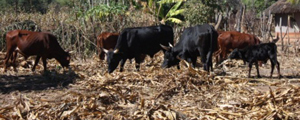
MANGWE MP Edward Mkhosi has expressed fears that it will take several years for his constituency to beef up its livestock herd after a record 5 476 cattle succumbed to last year’s drought.
Staff Reporter
According to livestock specialists, Matabeleland South lost more than 9 000 cattle due to shortage of pasture and water, with Mangwe district being the worst hit.
Matobo lost 1 232 cattle followed by Beitbridge (1 015), Gwanda (689), Insiza (665), Bulilima (172), and Umzingwane (23).
Mkhosi told NewsDay in an interview yesterday that drought had decimated over half of the cattle in his constituency.
“The death rate of cattle in my constituency was indeed very high this season,” he said. “This is because, for a long time, there was no water and no grass for the beasts. Areas around Empandeni, Brunapeg and going to Mambale were the worst affected.
“The problem was exacerbated by that during the land reform programme, we had a mismatch where a lot of people without cattle moved into farms and people with cattle remained in the reserves. So when we sat down to negotiate moving cattle to farms because there was a lot of grass there, the farm owners demanded that those who bring their cattle should leave one or two beasts for every 10 cattle as payment. This was just too much.”
Mkhosi said although his constituency had so far received significant rain, “it was too early to say the tide had changed”.
- Chamisa under fire over US$120K donation
- Mavhunga puts DeMbare into Chibuku quarterfinals
- Pension funds bet on Cabora Bassa oilfields
- Councils defy govt fire tender directive
Keep Reading
“Last Tuesday, it rained heavily and rivers and dams were so full of water. But it is too early to tell if it will save our cattle and if it will save people from hunger. The fact that the cattle that people depend on for farming were not fit for the task means that most people have not ploughed their fields so far. Most people have now resorted to using hand hoes to plough.
“Even if the rains continue up to March as predicted, there will be so much grass, but no crops; and that means people will continue to look up to the government for food handouts. The government should have done something a long time back. We will have water and grass, but there will be hunger for people.”











